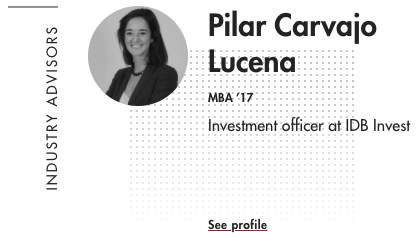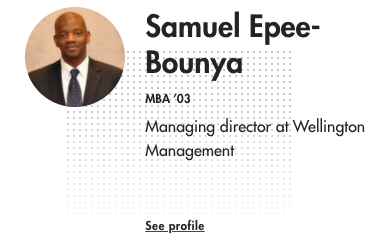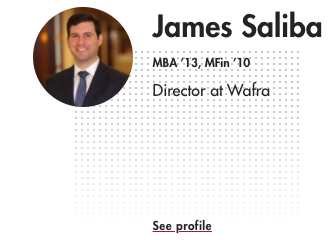By Meredith Somers | MIT Sloan Ideas Made to Matter | March 31, 2022
Like many other industries, finance has undergone significant change in the past 20 years. Seeking to tap the expertise of executives, we asked three MIT Sloan alumni to share their insights into the challenges, misunderstandings, and midcareer opportunities in finance.
 |
 |
 |
Here’s what they had to say.
What challenges need to be addressed in finance? What new roles are emerging, and where do you see opportunities for aspiring professionals to contribute and gain recognition?
Carvajo Lucena — After more than four years working in climate finance, I see climate change as the main challenge that needs to and can be addressed in finance. Not only incorporating it in the due diligence process, but also designing new financial products that help companies better adapt to climate change while pursuing innovation to reduce their carbon footprint. Facing this challenge will also create new opportunities and roles that will require multidisciplinary backgrounds and creative thinkers.
Saliba — Thanks to the democratization of data, improvements in technology, and the proliferation of talent, markets everywhere are maturing. As a result, returns — even in alternative asset classes — are naturally becoming commoditized. Managers will need to find new sources of assets and surface those assets to generate top quartile returns. How and where to find those assets and how to price them are enduring questions that the next generation of aspiring professionals will need to solve.
What’s one thing about finance that people outside the profession might not understand?
Saliba — A lot of people don’t realize how ordinary the practice of finance is, including alternative asset management. The business model is simple: We match sources of capital with uses of capital. The rest is complexity of our own making.
Carvajo Lucena — Roles in finance vary, and each requires a different type of skill set and personality traits. It is important to understand the nuances and find the best possible match for you.
Epee-Bounya — I like to believe finance can positively impact the world. For example, Wellington’s global impact bond fund focuses on companies and entities whose core businesses and projects address critical social and environmental issues.
If you had to advise rising professionals in finance to add one skill to their repertoire, what would it be?
Carvajo Lucena — A skill that can set you apart is to be a critical thinker and problem solver. Most of the value created by professionals in finance comes from thinking creatively about how to solve complex problems that require a move away from business as usual and toward new challenges that companies are facing all over the world.
Epee-Bounya — Data analytics and programming. The world of finance has increasingly embraced technology, but the trend is accelerating in investment management. I believe investment professionals have to be well-versed in data analytics tools and have enough programming knowledge to be able to build or improve their own investment analysis tools.
Saliba — While there’s no substitute for hard-won industry expertise, my experience has taught me that when the time comes it’s the person with the best communication skills — written communication and PowerPoint skills — who is tasked with articulating strategy. And when you hold the pen, you shape the message. In the right environment, effective communication can create a seat at the table.
Looking over your career, how did you know it was time to make a move? What advice would you give to other midcareer finance professionals contemplating a change?
Epee-Bounya — The moment you are no longer challenged or intellectually stimulated, it is time to seek other opportunities, internally or externally. If you reach a stage of boredom and/or don’t believe you are adding value in your current role or organization, it’s time for a change.
Saliba — I knew it was time to make a change when work became uninspiring and workdays felt like a grind. I advise those contemplating a change to take time for self-reflection. I thought as much about the qualities of the workplace I was looking for — the environment, how decisions are made, the size of the company, and so on — as I did about my potential career path.
Carvajo Lucena — If you are looking for a change, don’t be afraid! Talk to people and explore what else is out there. Find people in your network that can help you strengthen your weaknesses and identify your most transferable skills.
Who and what excites you in finance right now?
Epee-Bounya — I would like to highlight Wellington Access Ventures, which is Wellington’s early-stage venture fund focused on underrepresented founders. I sit on WAV’s investment committee, and I am seeing firsthand the catalytic role WAV is playing in proving critical early-stage growth capital to founders often overlooked by traditional VCs. I also serve as an adviser to The Lab Fund founded by Sloan alumni to provide early-stage funding to underrepresented founders.
Saliba — The future will be won by those firms who see their clients as partners and recognize the importance of sharing success with them. We are already seeing a wave of firms finding innovative opportunities to collaborate in private markets. Among them are managers, such as Wafra, and institutional leaders, such as the Public Institution for Social Security in Kuwait, the Alaska Permanent Fund Corporation, the UK’s Railpen, and AP3 out of Sweden. I’m excited to be part of a reimagining of how we — as alternative managers — do business, how we add value, and how we collaborate with sovereigns, pensions, and endowments.


